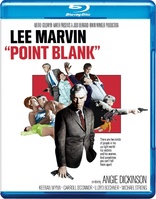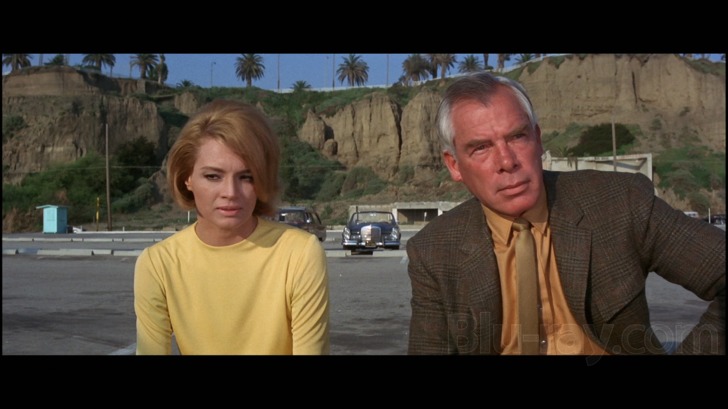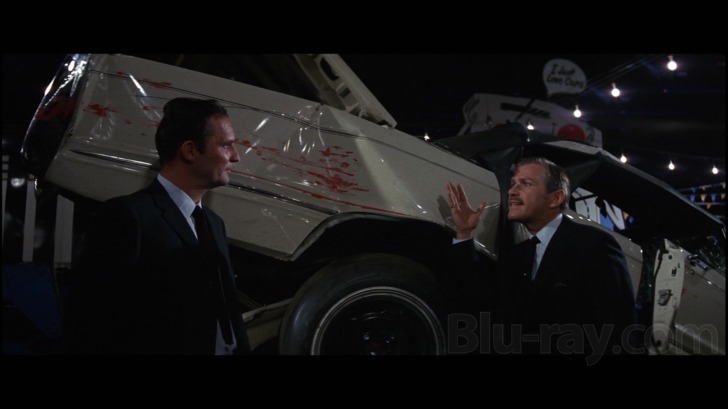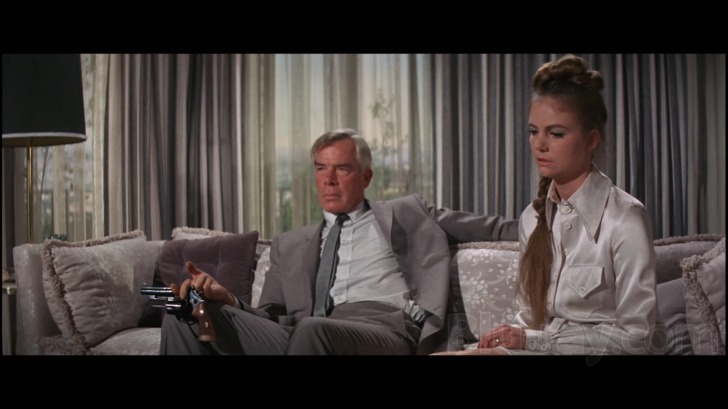Point Blank Blu-ray Movie
HomePoint Blank Blu-ray Movie 
Warner Bros. | 1967 | 92 min | Not rated | Jul 08, 2014
Movie rating
7.5 | / 10 |
Blu-ray rating
| Users | 4.5 | |
| Reviewer | 4.5 | |
| Overall | 4.5 |
Overview
Point Blank (1967)
After being double-crossed and left for dead, Walker single-mindedly tries to recover the money that was stolen from him.
Starring: Lee Marvin, Angie Dickinson, Keenan Wynn, Carroll O'Connor, Lloyd BochnerDirector: John Boorman
| Drama | 100% |
| Thriller | Insignificant |
| Crime | Insignificant |
| Action | Insignificant |
Specifications
Video
Video codec: MPEG-4 AVC
Video resolution: 1080p
Aspect ratio: 2.40:1
Original aspect ratio: 2.35:1
Audio
English: DTS-HD Master Audio Mono (48kHz, 24-bit)
German: Dolby Digital Mono
Spanish: Dolby Digital Mono
Spanish=Castilian & Latin
Subtitles
English SDH, French, Spanish, Japanese, German SDH
Discs
25GB Blu-ray Disc
Single disc (1 BD)
Playback
Region free
Review
Rating summary
| Movie | 5.0 | |
| Video | 4.0 | |
| Audio | 4.0 | |
| Extras | 3.0 | |
| Overall | 4.5 |
Point Blank Blu-ray Movie Review
Get Walker
Reviewed by Michael Reuben July 3, 2014Point Blank is so unlike any other film that it's hard to think of an apt comparison. It certainly doesn't resemble the Mel Gibson film Payback (either version), which was based on the same novel, The Hunter by Donald E. Westlake (under the pseudonym of "Richard Stark"). On the commentary track included with this Blu-ray release, director John Boorman recalls the script that existed when he was first recruited for the project by star Lee Marvin, which Marvin—literally—threw out the window of the room where they were meeting. Boorman jokes that a young Mel Gibson must have been passing in the street below, because, as Boorman recalls, that early script closely resembles Payback. The film that Boorman and Marvin made is something else altogether. Many of the qualities that make Point Blank so memorable and unique are difficult to describe without spoiling a first-time viewing experience. Let me put it this way: Point Blank appeared in the same year as Bonnie and Clyde, but it was even more daring in its cinematic technique. At a preview screening for studio executives, the film was greeted with incomprehension and muttering about reshoots. But Marvin was a major star with the clout to give final cut to Boorman, even though he was a young director making his first film in Hollywood. Boorman also had the support of MGM's legendary editor-in-chief, Margaret Booth, who, according to Boorman, said: "You touch one frame of this film over my dead body!" In both technique and attitude, Point Blank remains as disconcerting today as when the executives first saw it. Love it, hate it, or scratch your head over it, your knowledge of film noir and American crime cinema remains incomplete until you've experienced Point Blank.

Point Blank was the first production to film on Alcatraz after the federal prison was closed down in 1963. The film opens with a heist of an illicit cash transfer at the abandoned prison on behalf of "the Organization". The heist is engineered by Mal Reese (John Vernon, later famous as Dean Wormer in Animal House), because he needs money to discharge a debt to the very Organization from which he is stealing. For backup, Reese enlists his friend, Walker (Marvin), who has no first name, and Walker's wife, Lynne (Sharon Acker). But Reese shoots Walker, takes both his share and his wife, and leaves him for dead. All of this is presented with overlapping sound and jump cuts that fracture time and space, establishing the alternate reality of Walker's world, whatever it may be. Somehow he survives his wounds, recovers in isolation and manages to escape the island prison that was considered escape-proof. When we next see Walker, he is older, grayer and leaning on the railing of a tour boat listening to a guide describe how no one has ever escaped from Alcatraz. He is joined by a mysterious figure named Yost (Keenan Wynn), who tells him that his old partner, Reese, has now bought his way back into favor with the Organization. Periodically throughout the film, Yost reappears to provide Walker with useful information. For whatever reason, Yost wants to encourage Walker's quest for vengeance. Is he law enforcement, covert ops or a rival crime boss? Walker doesn't care, as long as the information is reliable. The two men avoid eye contact, like spies pretending they aren't actually talking. In Los Angeles, Walker locates Lynne, but Reese has moved on to Lynne's sister, Chris (Angie Dickinson), a jazz club manager who doesn't respond to Reese's advances. For her own personal reasons, and certainly not out of any affection for Walker, Chris agrees to help him. As Walker relentlessly works his way through the Organization, from low-level flunkies like the used car salesman, Stegman (Michael Strong), to corporate-style executives like Carter (Lloyd Bochner) and Brewster (Carroll O'Connor), he says that he simply wants the money he's owed from the Alcatraz job, which is $93,000. But is that really Walker's objective? Lee Marvin brought Point Blank to Boorman because he wanted to play Walker, and they worked together on developing both the character and his story, but it was Marvin who bucked the usual tendency of actors to expand their parts and instead cut many of Walker's lines, making him a perpetual cipher. Having been double-crossed once, Walker now treats every situation as a setup, and he is always right, because his very existence is an anomaly that Reese and the Organization must eliminate. His removal is assigned to an unnamed assassin played by James B. Sikking (who would play a similar role for Peter Hyams in Narrow Margin). What will Walker do with $93,000 if he ever obtains it? He no longer has ties to anyone or anything. His entire being has been devoted to delivering vengeance. As Chris tells him at one point, he might as well have died on Alcatraz. The same fracturing of time with which Point Blank opened recurs throughout the film, as current events are interrupted by memories, parallel events or cross-cuts. There are moments when Boorman and his editor, Henry Berman (Grand Prix), deliberately make the viewer uncertain about Walker's location in space and time. (As Boorman would later joke, the studio executives thought he needed a psychiatrist.) The disorientation continues right down to the film's ambiguous ending, which may prompt some to throw up their hands but will inspire others to immediately restart the film from the beginning. Marvin's Walker is one of the greatest examples in cinema of the famous adage that less is more. The less he tells you, the more elusive he becomes—and the more you want to know who he is and what's he's thinking.
Point Blank Blu-ray Movie, Video Quality 

Cinematographer Philip H. Lathrop (The Cincinnati Kid ) endeared himself to Boorman by saying, "Just tell me what you want, and I'll provide it." Although Point Blank is a color film, Boorman's visual concept was to make Walker's world as stark and barren as possible. He looked for angular, empty spaces, such as the L.A. drainage channels or the long airport corridor through which Walker enters the city, and he wanted monochromatic production design, with a single color dominating the frame wherever possible. Boorman also had Lathrop shoot most of the film with a newly developed Panavision lens that provided a wide angle but limited depth of field. Warner's 1080p, AVC-encoded Blu-ray of Point Blank is a superior effort, although it may be controversial for viewers used to contemporary films photographed and/or finished digitally. Many of the scenes on Alcatraz are dark and fairly grainy, reflecting the limitations of conditions on the island. (As shown in one of the accompanying featurettes, the opening scene of Walker's shooting was staged in an actual prison cell.) The blacks in these scenes—indeed, throughout the film—are very good, but detail disappears into the darkness, and that is a function of the original photography. Later, when Walker begins his campaign of vengeance, detail is consistently very good and sharpness is much improved, but only within the range where the lens can maintain focus. On either side of that range, sharpness falls off, and here again, that is a function of the original photography. (One crucial L.A. sequence, in the jazz club managed by Chris, takes place backstage in darkened conditions reminiscent of Alcatraz, with similarly dark and grainy results, and the same phenomenon occurs at the film's conclusion.) Colors can be remarkably vivid and saturated, if that was Boorman's intent for the scene, e.g., a red bathrobe that Chris dons for a tryst, or a yellow dress that she wears to accompany Walker on a scouting mission. In other scenes, however, colors can be almost black-and-white in their dullness, e.g., a scene in which a group of men are wearing similarly colored suits in an office with nondescript decor. These frequent visual shifts, especially when combined with the film's distinctive editing rhythms, all contribute to the unique experience that is Point Blank. One minute you're looking at a film noir; the next at a traditional crime story where the police will swoop in and the forces of right will prevail. It gives away nothing to say that Point Blank belongs to neither category. At an average bitrate of 24.72 Mbps, the disc falls at the high end of Warner's usual range, and the film's jagged editing needs every bit of available bandwidth. No doubt due to the relative paucity of video extras and the brevity of the film itself at 92 minutes, a BD-25 has proven adequate.
Point Blank Blu-ray Movie, Audio Quality 

Point Blank's original mono soundtrack has been encoded as lossless DTS-HD MA 1.0, and it's a stunning example of just how powerful and effective a mono mix can be. In a signature scene early in the film, Walker arrives in Los Angeles and strides briskly down a corridor at the airport, the sound of his footsteps drowning out everything else. Those footsteps continue to beat a path to Lynne Walker's door, as many other scenes play themselves out, including Walker driving up to the house where he knows Lynne now lives. It's as if, regardless of any intervening mode of transport, Walker continues to stride like a messenger of doom. Point Blank is full of such "subjective" effects, though none is quite as memorable as that early sequence, which owes an obvious debt to Sergio Leone. The Blu-ray's track does not have the breadth of dynamic range that one would find in a contemporary recording, but it still sounds remarkably good, neither shrill nor brittle at the top, nor constrained at the bottom. The dialogue is clear, and the odd but suspenseful score by Johnny Mandel (The Verdict) suits the film perfectly.
Point Blank Blu-ray Movie, Special Features and Extras 

Warner previously released Point Blank on 2005 with a commentary track and two vintage featurettes. These have been ported over to Blu-ray.
- Commentary with Director John Boorman and Steven Soderbergh: As a devoted fan of Point Blank who is also a director, Soderbergh is an ideal interviewer for Boorman, and he keeps the film's director talking on a variety of topics, from the purely technical (what lenses were used) to interactions among the actors (e.g., how Marvin and Vernon got along—not well, as it turns out) to the film's underlying themes (notably, who is Walker, which is not a straightforward question). If more commentary tracks had such a knowledgeable and interested interviewer/participant, there would be less filler and fewer pauses.
- The Rock, Pt. 1 (480i; 1.33:1; 7:33): This promotional short focuses on the massive operation required to shoot on location at Alcatraz.
- The Rock, Pt. 2 (480i; 1.33:1; 8:50): This alternative promotional short focuses on the prison's grim history through the memories of a former convict who served time there. It then turns to the subject of Point Blank.
- Theatrical Trailer (480i; 2.40:1; 2:51): "Walker is an emotional and primitive man."
Point Blank Blu-ray Movie, Overall Score and Recommendation 

When Mel Gibson's Payback first appeared in theaters, most reviews complained that it was a lesser film than Point Blank, but really the comparison is apples to oranges. Payback is a well-made but ultimately frivolous popcorn film. Point Blank is an existential meditation on loyalty, humanity and manhood (among other things) that reveals new dimensions with each viewing. Many consider it to be Lee Marvin's finest work, and it's certainly up there. Warner's Blu-ray presents the film well and is highly recommended.
Similar titles
Similar titles you might also like

The Public Enemy
1931

Charley Varrick
1973

Gangs of Wasseypur
2012

Get Carter
1971

Set Up
2011

Across 110th Street
1972

Payback
Straight Up: The Director's Cut | Special Collector's Edition
1999

Thief
1981

Get the Gringo
2012

Underworld U.S.A.
Limited Edition to 3000
1961

Bullets or Ballots
1936

A Bittersweet Life
2005

Busting
Limited Edition Reissue
1974

Beyond Outrage
アウトレイジ ビヨンド / Outrage Beyond
2012

Gloria
1980

The Hit
1984

Framed
1975

The Stone Killer
Limited Edition to 3000
1973

State of Grace
1990

The Roaring Twenties 4K
1939